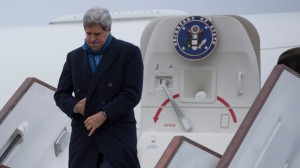
U.S. Secretary of State John Kerry secures his scarf as he walks down the stairs of his aircraft after landing at London's Stansted Airport, Sunday, Nov. 24, 2013. (AP Photo/Carolyn Kaster, Pool)
Although the word “historic” is being used in media reports, it’s too soon to tell whether the interim agreement struck over the weekend among five Western powers, China and Iran will lead to a lasting settlement of the longstanding stalemate over Iran’s nuclear enrichment program. But whatever the ultimate results, it is historic in one sense: it marks the first time in three decades that the US — “the great Satan” — and Iran — lynchpin of the “Axis of Evil” — have engaged in serious efforts toward détente.
Here are a series of articles that will give you everything you need to know about the agreement…
The Deal: Here’s the text of the agreement, courtesy of The Washington Post. Sergio Peçanha has an easily digestible graphic with the main points in The New York Times. And the Associated Press takes a look at the key players.
How We Got Here: Shashank Bengali reports for the Los Angeles Times that the US and Iran engaged in months of top-secret talks leading up to the breakthrough in Geneva. NPR’s Uri Berliner runs down the crippling economic sanctions that helped bring Iran to the table. But Simon Jenkins argues in The Guardian that efforts to strengthen Iranian democracy following a 2009 election that was widely viewed as illegitimate played an even larger role. Three weeks ago, Yeganeh Torbati reported for Reuters that Iranian Supreme Leader, Ayatollah Ali Khamenei, was pushing back against Iranian hard-liners, giving Iranian President Hassan Rouhani political space to push for a deal. And Said Arjomand, Director of SUNY Stony Brook’s Institute for Global Studies, wrote earlier this month that Rouhani had a mandate to ease tensions with the West that previous reformers lacked.
Reactions: University of Michigan Mideast scholar Juan Cole argues on his blog, Informed Comment, that “the decade-long Neoconservative plot to take the United States to war against Iran appears to have been foiled” by the deal. Unsurprisingly, congressional Iran hawks on both sides of the aisle aren’t pleased, according to Bernie Becker at The Hill. Critics accuse the administration of “capitulation,” which The Daily Beast’s Peter Beinhart says is a gross misreading of history. Siobhan Gorman reports for The Wall Street Journal that Sen. Chuck Schumer (D-NY) has indicated that Congress may try to impose even more sanctions, which the White House calls a path to war.
The Region: Saeed Kamali Dehghan reports for The Guardian that the Iranian public appears to be very happy about the deal. Israeli Prime Minister Bibi Netanyahu is outraged by the deal, but Israeli journalist Gershom Gorenberg writes in The American Prospect that his reaction says more about him than the deal itself. And at 972 Magazine, Larry Derfner notes that the Israeli security community is a lot more optimistic about the deal than the country’s elected officials. The BBC taps its extensive network of reporters to bring mixed reactions from around the region. And Mark Landler reports for The New York Times that the deal could “open the door” to diplomatic solutions of other regional issues.
Looking Ahead: Matthew Rusling reports for Xinhua that the next six months will be critical. In The New York Times, Michael Gordon looks at some potential roadblocks coming up. And Brooking’s Shadi Hamid writes that Arab countries’ concerns can be ameliorated if the US broadens the scope of the final deal.
Looking Back: The Associated Press has a brief timeline of the key moments in US-Iranian relations over the past 60 years. For Iranians, the animosity began with US involvement in the coup that toppled Mohammed Mossadeghin 1953, which John Amaruso recounts in the Las Vegas Courier-Express. And Tabassum Zakaria reports for Reuters that former US hostages taken by Iran in 1979 are still seeking closure. Paul Pillar has a long-read from last year in The Washington Monthly on Iran’s nuclear program and how it has been overhyped by many in the West. And at MSNBC, Dafna Linzer laments that this deal could have been struck ten years ago, which would have avoided a lot of suffering.
We’ll update this page as events dictate.

